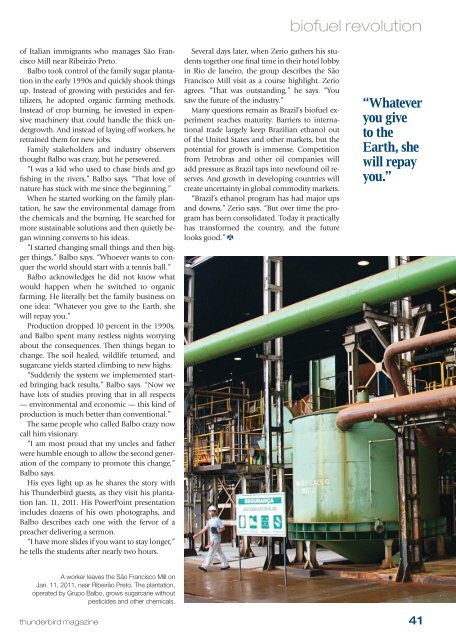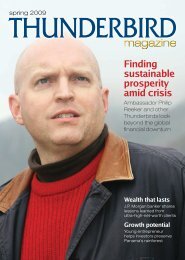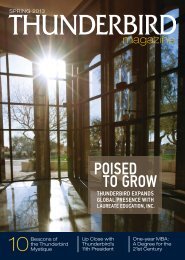Spring 11 MASTER.indd - Thunderbird Magazine
Spring 11 MASTER.indd - Thunderbird Magazine
Spring 11 MASTER.indd - Thunderbird Magazine
You also want an ePaper? Increase the reach of your titles
YUMPU automatically turns print PDFs into web optimized ePapers that Google loves.
iofuel revolution<br />
of Italian immigrants who manages São Francisco<br />
Mill near Ribeirão Preto.<br />
Balbo took control of the family sugar plantation<br />
in the early 1990s and quickly shook things<br />
up. Instead of growing with pesticides and fertilizers,<br />
he adopted organic farming methods.<br />
Instead of crop burning, he invested in expensive<br />
machinery that could handle the thick undergrowth.<br />
And instead of laying off workers, he<br />
retrained them for new jobs.<br />
Family stakeholders and industry observers<br />
thought Balbo was crazy, but he persevered.<br />
“I was a kid who used to chase birds and go<br />
fishing in the rivers,” Balbo says. “That love of<br />
nature has stuck with me since the beginning.”<br />
When he started working on the family plantation,<br />
he saw the environmental damage from<br />
the chemicals and the burning. He searched for<br />
more sustainable solutions and then quietly began<br />
winning converts to his ideas.<br />
“I started changing small things and then bigger<br />
things,” Balbo says. “Whoever wants to conquer<br />
the world should start with a tennis ball.”<br />
Balbo acknowledges he did not know what<br />
would happen when he switched to organic<br />
farming. He literally bet the family business on<br />
one idea: “Whatever you give to the Earth, she<br />
will repay you.”<br />
Production dropped 10 percent in the 1990s,<br />
and Balbo spent many restless nights worrying<br />
about the consequences. Then things began to<br />
change. The soil healed, wildlife returned, and<br />
sugarcane yields started climbing to new highs.<br />
“Suddenly the system we implemented started<br />
bringing back results,” Balbo says. “Now we<br />
have lots of studies proving that in all respects<br />
— environmental and economic — this kind of<br />
production is much better than conventional.”<br />
The same people who called Balbo crazy now<br />
call him visionary.<br />
“I am most proud that my uncles and father<br />
were humble enough to allow the second generation<br />
of the company to promote this change,”<br />
Balbo says.<br />
His eyes light up as he shares the story with<br />
his <strong>Thunderbird</strong> guests, as they visit his plantation<br />
Jan. <strong>11</strong>, 20<strong>11</strong>. His PowerPoint presentation<br />
includes dozens of his own photographs, and<br />
Balbo describes each one with the fervor of a<br />
preacher delivering a sermon.<br />
“I have more slides if you want to stay longer,”<br />
he tells the students after nearly two hours.<br />
Several days later, when Zerio gathers his students<br />
together one final time in their hotel lobby<br />
in Rio de Janeiro, the group describes the São<br />
Francisco Mill visit as a course highlight. Zerio<br />
agrees. “That was outstanding,” he says. “You<br />
saw the future of the industry.”<br />
Many questions remain as Brazil’s biofuel experiment<br />
reaches maturity. Barriers to international<br />
trade largely keep Brazilian ethanol out<br />
of the United States and other markets, but the<br />
potential for growth is immense. Competition<br />
from Petrobras and other oil companies will<br />
add pressure as Brazil taps into newfound oil reserves.<br />
And growth in developing countries will<br />
create uncertainty in global commodity markets.<br />
“Brazil’s ethanol program has had major ups<br />
and downs,” Zerio says. “But over time the program<br />
has been consolidated. Today it practically<br />
has transformed the country, and the future<br />
looks good.”<br />
“Whatever<br />
you give<br />
to the<br />
Earth, she<br />
will repay<br />
you.”<br />
A worker leaves the São Francisco Mill on<br />
Jan. <strong>11</strong>, 20<strong>11</strong>, near Ribeirão Preto. The plantation,<br />
operated by Grupo Balbo, grows sugarcane without<br />
pesticides and other chemicals.<br />
thunderbird magazine 41

















